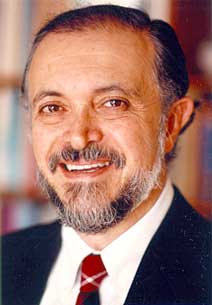 Last night, I attended Café Scientifique, a free for the public monthly event that features diverse scientists and topics. Last night, the speaker was Nobel Laureate Mario J. Molina, PhD, and the topic was climate change. Dr. Molina (pictured at right) gave a great synopsis on climate change, the data supporting it, and the issues surrounding it. At the end of his talk, he opened the floor to questions and comments, and this is the reason for this post.
Last night, I attended Café Scientifique, a free for the public monthly event that features diverse scientists and topics. Last night, the speaker was Nobel Laureate Mario J. Molina, PhD, and the topic was climate change. Dr. Molina (pictured at right) gave a great synopsis on climate change, the data supporting it, and the issues surrounding it. At the end of his talk, he opened the floor to questions and comments, and this is the reason for this post.In this Q&A session, a gentleman asked a question that has had me thinking ever since. Although I cannot remember his exact words, the general idea was that Congressional leaders do not necessarily have the technical background and scientific training to truly understand climate change, particularly the science behind it and the solutions being offered. So, his question was basically should we be sitting back and letting them make the decisions when clearly they do not have the training.
While the speaker answered, I felt the question needed more discussion, but the conversation quickly changed before I could comment - so…
To the gentleman who asked this question:
First, I’d like to say that I don’t think that you’re alone. I get the impression that many people feel that once elected, the policy makers should be left to do their jobs. We entrust them to make the decisions on issues ranging from science and healthcare, to war and diplomacy while we go about our lives. Certainly, there are issues that spark public debates, but it seems that experts in the field often take a back seat to this.
Now, to be fair, I don’t know whether or not you’re a scientist, but I was a bit disappointed to hear this question posed in a room that I expect was full of scientists; and I was even more disappointed that there was less of a reaction to your question. Here’s the thing, as scientists, we are the experts, and we should be the ones speaking to our leaders.
Now certainly some of our Congressional members do have training in the sciences, but most do not. They certainly do not have specialized knowledge in every single area of upon which they make decisions. They would be superhuman if that were the case. This is why they hire staff. The staff specialize in particular areas, and their job is to make sure the Congressional member knows what they need to know for each of these issues. But should we even trust that each staff member has the expertise? Absolutely not!!!
If you, as a citizen, are an expert in a particular field then it is your responsibility to pass that knowledge on to our Congressional leaders. You absolutely should not be trusting that your elected officials, once in office, no longer need your support. How will they know what their constituency wants if you remain silent? How can they become well-informed when the experts in the fields won’t talk to them?
So let me re-emphasize, as an expert in your field, YOU ARE NEEDED. I think as scientists, we often forget that not everyone who needs to see our data is going to be actively seeking it out. We need to recognize that we need to be proactive in helping to affect policy decisions. We need to make sure that our leaders are seeing and understanding the data, and make data-driven recommendations on how best to have policy decisions reflect the data.
Take Dr. Molina, our speaker, as an example. He and his colleagues not only discovered that CFCs were causing a hole in the ozone layer, but he went one step further and took that information to our elected officials. He talked himself blue until policy changes were finally made. He knew that he had an obligation as a citizen and scientist to not only make the discovery, but to make it known.
So sir, I apologize for the length of this letter, but I have to say that I am tired of this idea that we are second-class citizens. The government is supposed to be working FOR us, not against us. In sitting back and “letting them do their jobs” without offering our expertise, we are hurting science, and ourselves. If you choose not to affect policy, then you absolutely cannot complain when you find it going away from the science. So, my simple answer to your question is, as the experts, we need to be talking to our policy-makers, and we should never accept a passive role in the policy process.
Thank you for listening.
Sincerely,
Jacqueline Maffucci, PhD

Thank you Jackie for making these critical arguments and for caring enough to do so. You provide hope that the next generation of scientists will feel the call of public service and will engage proactively.
ReplyDelete